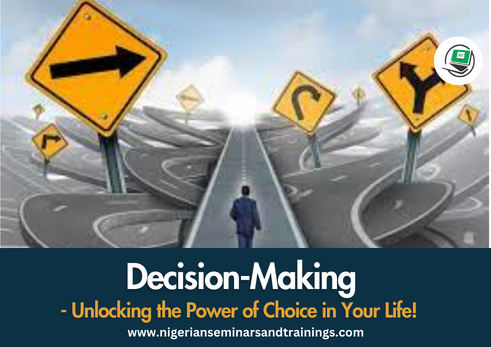 |
Decision-Making - Unlocking the Power of Choice in Your Life! |
Are you tired of making decisions that lead to dead ends? Do you ever wonder if there are better ways to make decisions, one that will benefit you and your organization in the long run? You are not alone!
Decision-making is the process of choosing a course of action from a range of alternatives. It sounds simple enough, right? But the reality is, whereas making effective decisions is crucial to success, decision-making can be complex and challenging. Whether it's deciding on a career path, choosing a life partner, or selecting the best investment strategy, our choices ultimately shape our lives. In this article, we will explore the importance of decision-making and provide insights on how to make better choices by following a strategic approach. Through understanding the decision-making process and adopting a proactive mindset, you can unlock the power of choice and create a life filled with fulfillment and purpose.
The Importance of Decision-Making
The ability to make right decisions is the cornerstone of personal and professional success. It is an essential life skill that allows us to navigate the myriad of choices we face daily. By making well-informed decisions, we can optimize our resources, minimize risks, and maximize opportunities.
Effective decision-making can lead to:
- Improved self-confidence: When we make informed decisions, we feel more in control of our lives and develop a stronger sense of self-confidence.
- Better problem-solving: Decision-making is central to problem-solving, as it helps us identify and implement solutions to challenges.
- Increased satisfaction: By making good decisions, we are more likely to achieve our goals and experience a higher level of satisfaction in life.
- Greater adaptability: Effective decision-makers can quickly adapt to changing circumstances and make the best of any situation.
The Decision-Making Process
Understanding the decision-making process can help us make better choices. Although each decision is unique, most follow a similar pattern. Here are the five steps to effective decision-making:
- Identify the problem or opportunity: The first step is to recognize the issue at hand or the opportunity for improvement. Clearly define your objectives and determine what factors are essential to consider.
- Gather information and analyze options: Conduct thorough research to collect relevant data, insights, and potential solutions. Consider various alternatives and weigh their pros and cons. This step may involve consulting experts, seeking feedback, and reviewing past experiences.
- Evaluate alternatives: Assess each option based on your objectives, priorities, and values. Consider the short-term and long-term consequences of each choice, as well as potential risks and rewards.
- Make a decision: After a careful evaluation, choose the best option that aligns with your goals and values. Be confident in your decision, knowing that you've given it thorough consideration.
- Implement and review: Put your decision into action and monitor its progress. Be prepared to adjust your approach if needed and learn from the outcomes to improve future decision-making.
Tips for Better Decision-Making
To enhance your decision-making skills, consider incorporating these strategies:
- Avoid decision fatigue: Making too many decisions in a short period can lead to mental exhaustion and poor choices. Prioritize your decisions and focus on the most critical ones.
- Embrace the power of intuition: While analyzing data and considering options are essential, don't underestimate the power of your gut feeling. Intuition can offer valuable insights that may not be apparent through logical analysis.
- Beware of cognitive biases: Our minds are prone to biases that can skew our decision-making. Be aware of common biases, such as confirmation bias, anchoring, and overconfidence, and strive to overcome them.
- Accept uncertainty: No decision is risk-free, and it's impossible to predict the future with certainty. Embrace the unknown and be prepared to adapt as conditions change.
- Learn from your experiences: Reflect on your past decisions – both successful and unsuccessful – to identify patterns and areas for improvement. Continuously refine your decision-making skills through practice and self-awareness.
Effective decision-making is a vital skill. By understanding decision-making process and adopting a strategic approach, you can unlock the power of choice and create a life filled with purpose and success. Embrace your ability to make decisions with confidence, learn from your experiences, and use your newfound skills to navigate the many opportunities and challenges that life presents. Remember, every decision is an opportunity to grow and shape your reality – make those choices count!
Related Articles

|
Interest Rates Behaviors and Monetary Policy ResponseA stable deposit base as opposed to volatile, short-term funds has started to impact positively on interest rates stability. In order to fast track interest rates stability, the CBN introduced a new framework for the implementation of monetary policy in December of 2006. As part of the new framework [Read more]
|
Posted: 14 years ago |

|
Ten Tips for Running Effective MeetingsIf there’s one thing we cannot buy, it’s time. Time is fleeting and it is important for us all to make the most of the time we are allotted. We all get 24 hours, but what we do with those hours is up to us. And this is why spending our time efficiently should be of utmost importance.
[Read more]
|
Posted: 7 years ago |

|
Thinking Through Problem SolvingChange hits hard, fast, and often. It shifts our focus, changes our direction, and alters our plans. Change leaves us stumped by questions we are not prepared to answer and searching for questions that we never thought to ask. Left on the road, between what we were once sure of and the indecision of [Read more]
|
Posted: 16 years ago |


